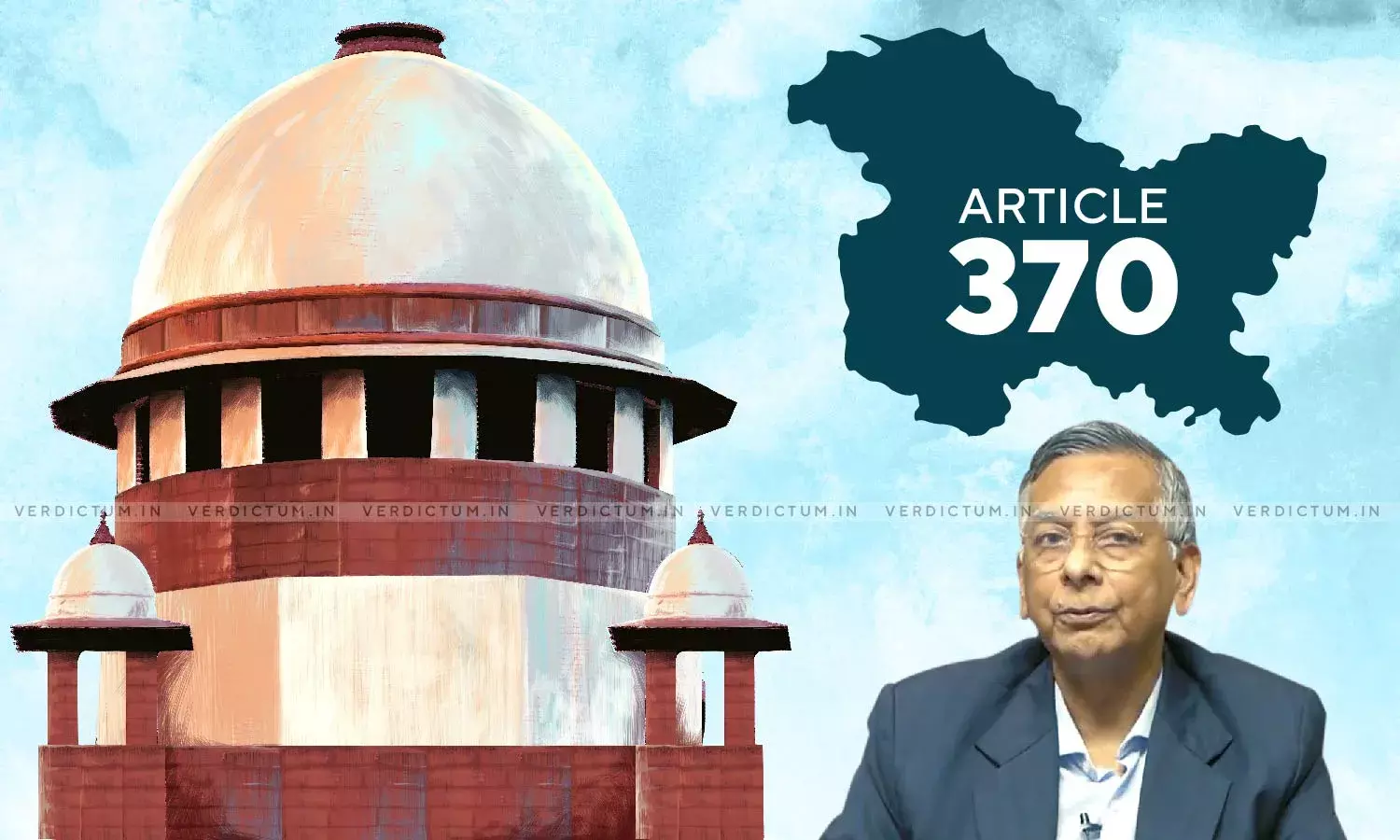No One Can Have Vested Right In Favour Of Perennial State Of Unrest: Attorney General's Opening Statements In Article 370 Case
The Constitution Bench of the Supreme Court, today, after the heavy 9 days of submissions made by the Petitioners in the batch of cases challenging the abrogation of Article 370, started the hearing with submissions made by the Attorney General R. Venkatramani appearing for the Union of India.
The bench of the Chief Justice of India D.Y. Chandrachud, Justice Sanjay Kishan Kaul, Justice Sanjiv Khanna, Justice BR Gavai, and Justice Surya Kant, commenced the hearing of the Respondents' side, with the Attorney General delivering the opening statement on behalf of the Union of India. The AG expressed his gratitude to all the colleagues on the petitioners' side for their insightful understanding of this emotionally charged and complex issue. He further said that, as we proceed, we aim to present our perspective while maintaining objectivity and considering the new realities associated with this matter.
Citing a statement from Abraham Lincoln in 1864, the Attorney General remarked that in a context similar to the present, Lincoln discussed the intricate balance between upholding the nation, preventing its loss, and preserving the Constitution. Lincoln's words were, "By general law life and limb must be protected; yet often a limb must be amputated to save a life; but a life is never wisely given to save a limb".
The AG submitted that striking a balance between averting national loss and upholding the constitution entails emphasizing that the preservation of the Constitution hinges on adhering to due processes and parallel procedures. Remarking on the same the CJI said, "But AG we can't postulate a situation where the ends justify the means also, right? Means have also to be consistent with ends".
Further, the AG submitted, "The factual or legal foundation for any sovereignty argument, in a combined reading of instrument of accession and proclamation, followed by the adoption of Article 370, all trace of sovereignty, if any, were surrendered and disappeared. The Constitutional integration process of the State of Jammu and Kashmir with the Union of India however sought to be were only for the object of Article 370. All principles and procedures for the above purpose will always be considered subservient to this purpose. The power and deliberation of the President under Article 370 to deal with it in any manner is neither lost nor removed by the reason of its excessive over a period of time nor it can be said that the provision erases itself with any intervention of positive law-making power."
Continuing, the AG stated, "Article 370 was conceded and designed to aid the constitutional integration process on the same line as it happened with other States. Its continued exercise over a period cannot be seen as a cloud over or a distortion of its original purpose. Any description exercise beyond its original purpose seen as introducing rooms or otherwise can always be deliberated upon to bring about any changes in its contents or its abrogation. All judicial pronouncements in regard to Article 370 will be seen in the context of challenges and claims raised before the Court."
Commenting upon the special feature of the Union Territory of Jammu and Kashmir, the AG said "Border states are a special clan of territories of India and the organization under Article 3 will reserve distinct consideration. The Court will defer to the wisdom of parliament and the choice and action relating to border states and the justiciability of decisions taken to deal with matters relating to border states may not be as in a case of general run or reorganization of States or imposition of President's rules."
"The scheme and architecture of Article 356 which provides in regards to the sustenance of the fabric of the nation will not be narrowed or compressed. All instruments in aid of discharge of duty under Article 355 including the preamble of the Constitution will be comprehended in the plenary power of parliament to engage in the reorganization scheme under Article 3. The plenary power to act under Article 3 is available even during rule under Article 356 longstanding or similar measures in regard to reorganization. The availability of power is distinct from any due process. Neither asymmetrical federalism nor any other federal features have been infringed, no rights in the election of representative democracy have been taken, and the reorganization of states included temporary but another rearrangement of rights that serve integration and federalism. No person can have a vested right in favour of the perennial state of unrest and all instruments of law which have not subserved peace and justice have no inherent justice right to continue or to exist", stated the AG.
As the AG wrapped up his opening submissions, he mentioned that he extensively examined numerous presidential proclamations, amounting to hundreds, focusing particularly on Jammu and Kashmir. The suspension of the two provisos and the absence of deletions remain applicable in this context. To assert that there has been a complete subversion of the Constitution is entirely misguided. He stressed that due process has been diligently followed, and all actions are well within legitimate means, including the Reorganization Act.




